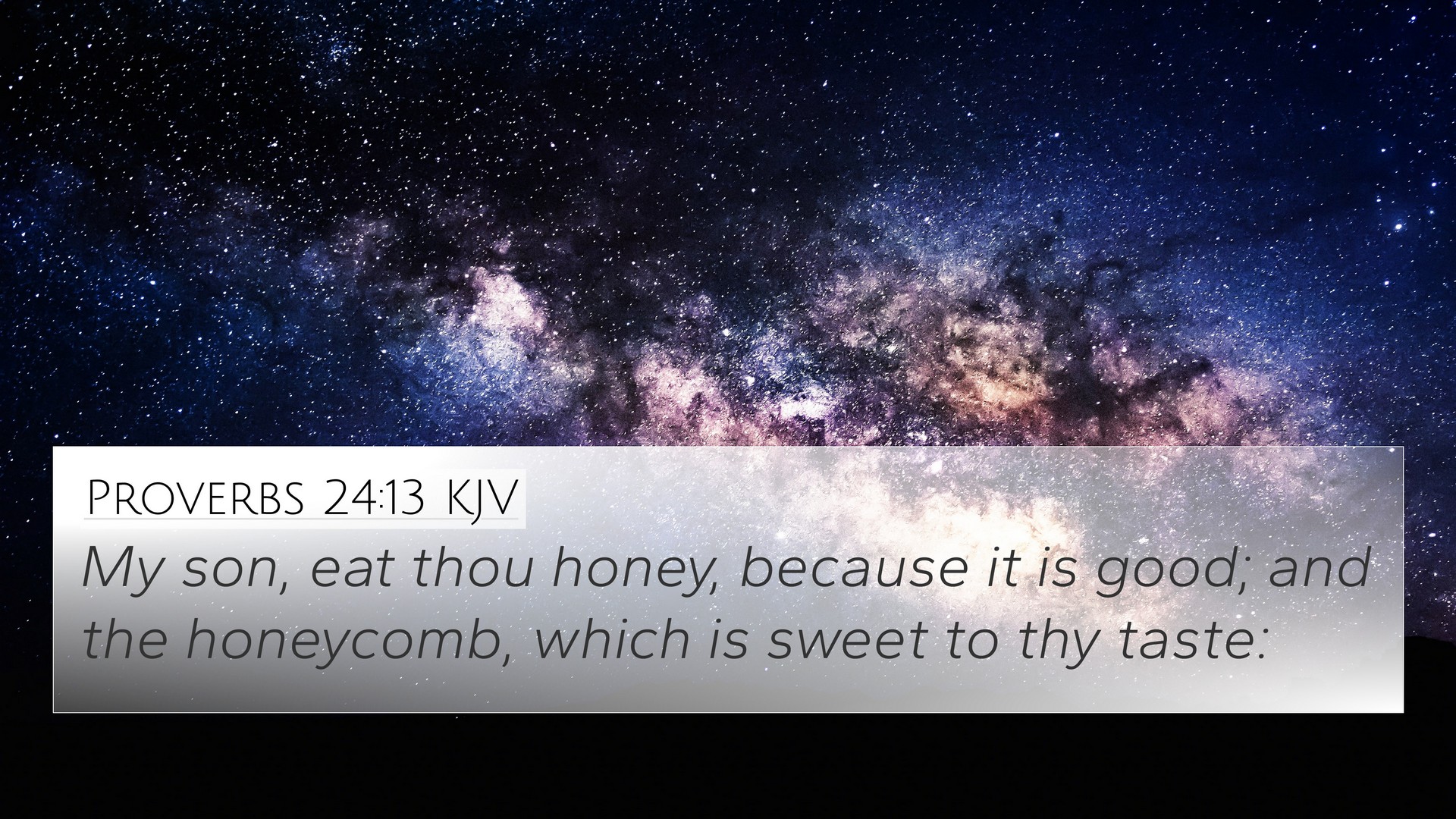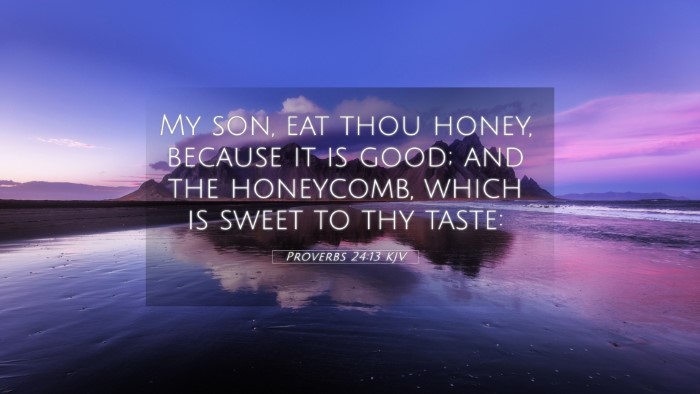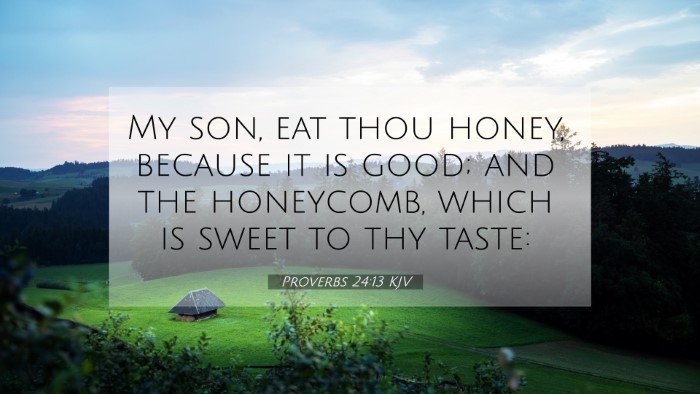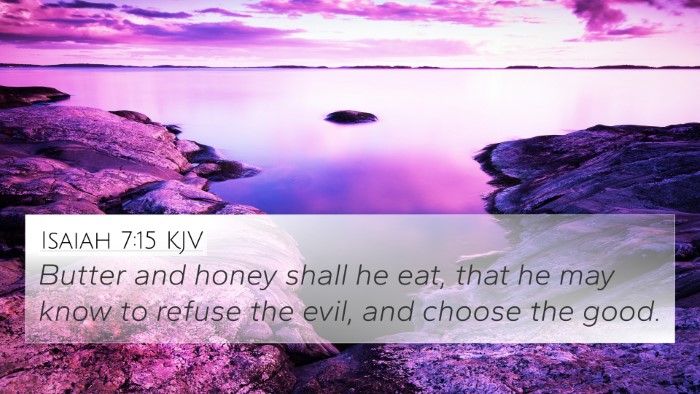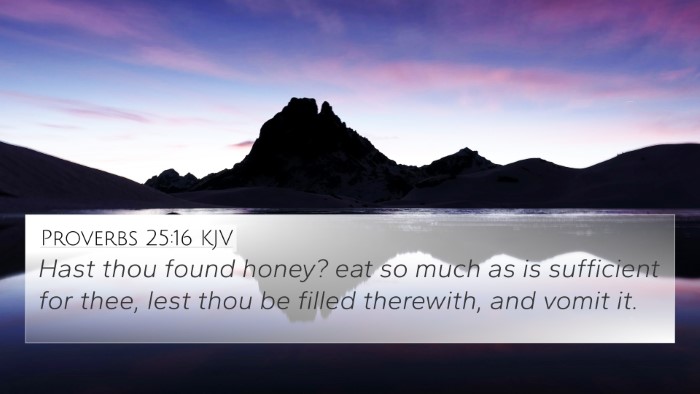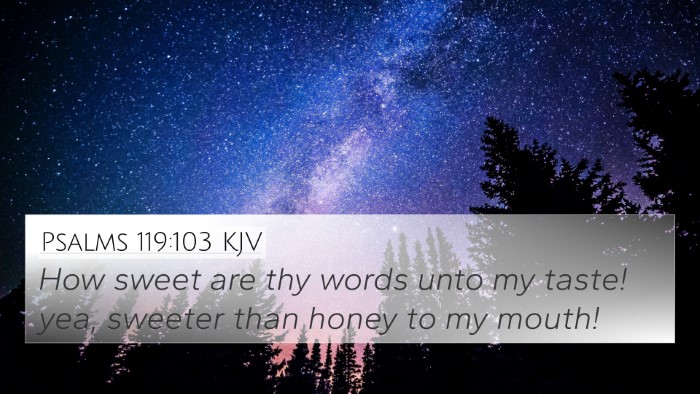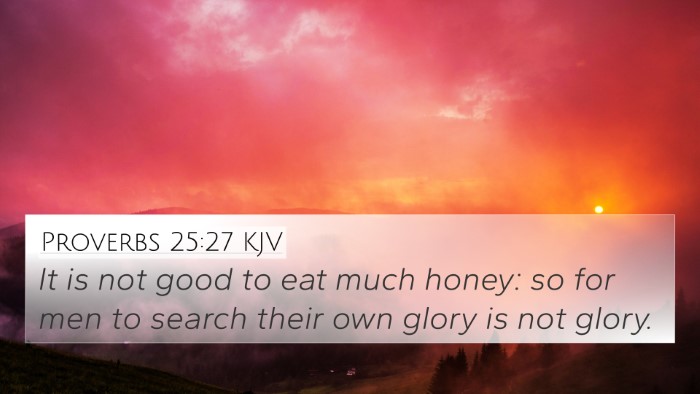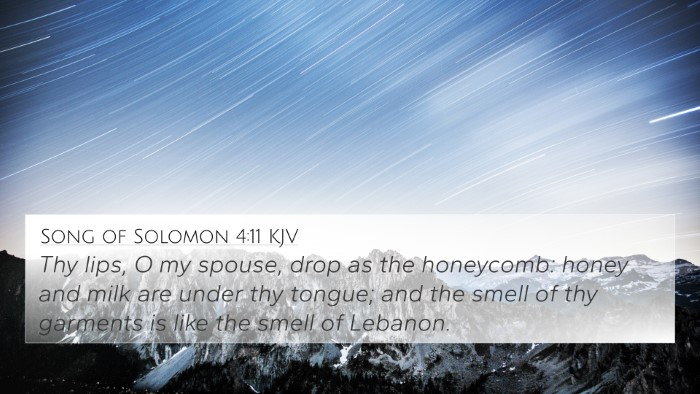Understanding Proverbs 24:13
Proverbs 24:13 states, "My son, eat thou honey, because it is good; and the honeycomb, which is sweet to thy taste." This verse serves as a metaphor illustrating the value of wisdom and knowledge, which are often depicted as sweet and nourishing, similar to honey. This commentary aims to delve into the layers of understanding surrounding this passage, drawing insights from various public domain commentaries and linking it with other relevant scriptures.
Insights from Commentaries
According to Matthew Henry, this verse encourages the pursuit of wisdom by equating it to the delight found in tasting honey. There is an inherent sweetness in both honey and wisdom, suggesting that the acquisition of knowledge brings pleasure and benefit to the seeker. Henry also notes that honey is a metaphor for the rewards of wisdom, highlighting that just as honey is good for consumption, wisdom is essential for a righteous life.
Albert Barnes complements this idea by suggesting that wisdom, much like honey, has nourishing qualities. He emphasizes that the enjoyment derived from wisdom parallels the physical satisfaction provided by food. Barnes outlines how the sweetness of honey signifies joy and fulfillment, something attainable by embracing wisdom and understanding.
Adam Clarke further adds depth by discussing the significance of taste in understanding spiritual truths. Clarke posits that just as honey is pleasant to the taste, so is wisdom to those who earnestly seek it. He indicates that the act of eating honey symbolizes an active engagement with wisdom, suggesting that one should take it in daily to foster spiritual growth and insight.
Thematic Connections
The theme of Savoring Wisdom resonates deeply within this verse. It demonstrates the connections between wisdom in biblical texts and invites readers to compare various scriptures that speak on the value of knowledge. Here are some pertinent cross-references that amplify the message of Proverbs 24:13:
- Proverbs 16:24 - "Pleasant words are as a honeycomb, sweet to the soul, and health to the bones." This verse echoes similar sentiments regarding the sweetness of wisdom.
- Job 23:12 - "Neither have I gone back from the commandment of his lips; I have esteemed the words of his mouth more than my necessary food." This highlights the importance of valuing wisdom as one's sustenance.
- Psalms 19:10 - "More to be desired are they than gold, yea, than much fine gold: sweeter also than honey and the honeycomb." This reinforces the connection between wisdom and sweetness.
- Psalms 119:103 - "How sweet are thy words unto my taste! yea, sweeter than honey to my mouth!" This verse explicitly connects wisdom with the delightful taste of honey.
- Matthew 7:7-8 - "Ask, and it shall be given you; seek, and ye shall find; knock, and it shall be opened unto you." This illustrates how the search for wisdom is rewarded.
- James 1:5 - "If any of you lack wisdom, let him ask of God, that giveth to all men liberally, and upbraideth not; and it shall be given him." This underscores the accessibility of divine wisdom.
- Proverbs 3:13-18 - "Happy is the man that findeth wisdom, and the man that getteth understanding." This passage details the blessings that arise from acquiring wisdom.
Linking Bible Scriptures
By establishing connections between these verses, we gain a comprehensive understanding of the pursuit and appreciation of wisdom in the biblical narrative. The act of eating honey metaphorically underscores the sweetness of receiving knowledge and faithfully applying it in one’s life. Readers can find that the scripture encourages a desire for wisdom as a fundamental aspect of a fulfilling and spiritually enriching life.
Tools for Cross-Referencing
For those interested in more extensive studies on this theme, tools for Bible cross-referencing, such as a Bible concordance, can significantly enhance your study. A Bible cross-reference guide provides structured ways to explore these links further, and engaging in cross-reference Bible study can yield rich insights.
Comparative Bible Verse Analysis
When engaging in a comparative Bible verse analysis, one can pull together various scriptural insights that not only expand or clarify the meaning of Proverbs 24:13 but also weave a deeper thematic understanding that spans across the Old and New Testaments. Understanding these connections does not just inform but transforms the reader's approach to scriptural wisdom.
Conclusion
Proverbs 24:13 invites believers to an intimate experience with godly wisdom similar to enjoying the natural sweetness of honey. Through the examination of various commentaries and biblical references, one can grasp how the Bible intricately links the principles of wisdom and knowledge as essential for a fulfilling life. As you study this verse, may you be encouraged to seek wisdom with the same eagerness as tasting the most delightful honey.
